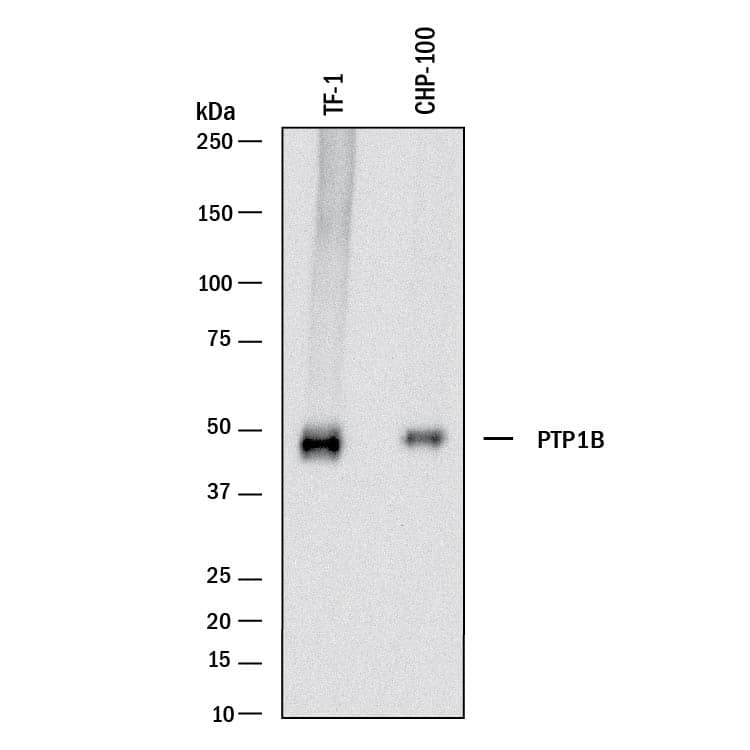Human/Mouse/Rat PTP1B Antibody
R&D Systems, part of Bio-Techne | Catalog # AF13661

Key Product Details
Species Reactivity
Applications
Label
Antibody Source
Product Specifications
Immunogen
Glu2-Asn321
Accession # P18031
Specificity
Clonality
Host
Isotype
Scientific Data Images for Human/Mouse/Rat PTP1B Antibody
Detection of Human PTP1B by Western Blot.
Western blot shows lysates of TF-1 human erythroleukemic cell line and CHP-100 human neuroblastoma cell line. PVDF membrane was probed with 0.5 µg/mL of Goat Anti-Human/Mouse/Rat PTP1B Antigen Affinity-purified Polyclonal Antibody (Catalog # AF13661) followed by HRP-conjugated Anti-Goat IgG Secondary Antibody (Catalog # HAF017). A specific band was detected for PTP1B at approximately 50 kDa (as indicated). This experiment was conducted under reducing conditions and using Immunoblot Buffer Group 1.Detection of Human, Mouse, and Rat PTP1B by Western Blot.
Western blot shows lysates of HeLa human cervical epithelial carcinoma cell line, L-929 mouse fibroblast cell line, and PC-12 rat adrenal pheochromocytoma cell line. PVDF membrane was probed with 1 µg/mL of Goat Anti-Human/Mouse/Rat PTP1B Antigen Affinity-purified Polyclonal Antibody (Catalog # AF13661) followed by HRP-conjugated Anti-Goat IgG Secondary Antibody (Catalog # HAF017). A specific band was detected for PTP1B at approximately 50 kDa (as indicated). This experiment was conducted under reducing conditions and using Immunoblot Buffer Group 1.Detection of Human PTP1B by Simple WesternTM.
Simple Western lane view shows lysates of MCF-7 human breast cancer cell line, loaded at 0.2 mg/mL. A specific band was detected for PTP1B at approximately 57 kDa (as indicated) using 10 µg/mL of Goat Anti-Human/Mouse/Rat PTP1B Antigen Affinity-purified Polyclonal Antibody (Catalog # AF13661) followed by 1:50 dilution of HRP-conjugated Anti-Goat IgG Secondary Antibody (Catalog # HAF109). This experiment was conducted under reducing conditions and using the 12-230 kDa separation system.Applications for Human/Mouse/Rat PTP1B Antibody
Simple Western
Sample: MCF‑7 human breast cancer cell line
Western Blot
Sample: TF‑1 human erythroleukemic cell line, CHP‑100 human neuroblastoma cell line, HeLa human cervical epithelial carcinoma cell line, L‑929 mouse fibroblast cell line, and PC‑12 rat adrenal pheochromocytoma cell line
Formulation, Preparation, and Storage
Purification
Reconstitution
Formulation
Shipping
Stability & Storage
- 12 months from date of receipt, -20 to -70 °C as supplied.
- 1 month, 2 to 8 °C under sterile conditions after reconstitution.
- 6 months, -20 to -70 °C under sterile conditions after reconstitution.
Background: PTP1B
Protein tyrosine phosphatase 1B (PTP1B) is an enzyme that removes phosphate groups covalently attached to tyrosine residues in proteins. This ubiquitously expressed enzyme is anchored in the endoplasmic reticulum by its C-terminal end and has its catalytic regions exposed to the cytosol. The recombinant protein lacks the C-terminal 114 amino acids but is fully active. PTP1B will dephosphorylate a wide variety of phosphoproteins, such as receptors for the growth factors insulin and epidermal growth factor (EGF), c-Src and beta-catenin. Of particular interest is the observation that PTP1B knock-out mice are resistant to high-caloric intake-induced obesity and have exaggerated insulin responses, suggesting that PTP1B may play an important role in regulating growth factor responsiveness.
References
- Angers-Loustau, et al. (1999) Biochem. Cell Biol. 77:493.
- Sarmiento, et al. (1998) J. Biol. Chem. 273:26368.
- Bjorge, et al. (2000) J. Biol. Chem. 52:41439.
- Balsamo, et al. (1996) J. Cell Biol. 134:801.
- Elchebly, et al. (1999) Science 283:1544.
Long Name
Alternate Names
Gene Symbol
UniProt
Additional PTP1B Products
Product Documents for Human/Mouse/Rat PTP1B Antibody
Product Specific Notices for Human/Mouse/Rat PTP1B Antibody
For research use only


